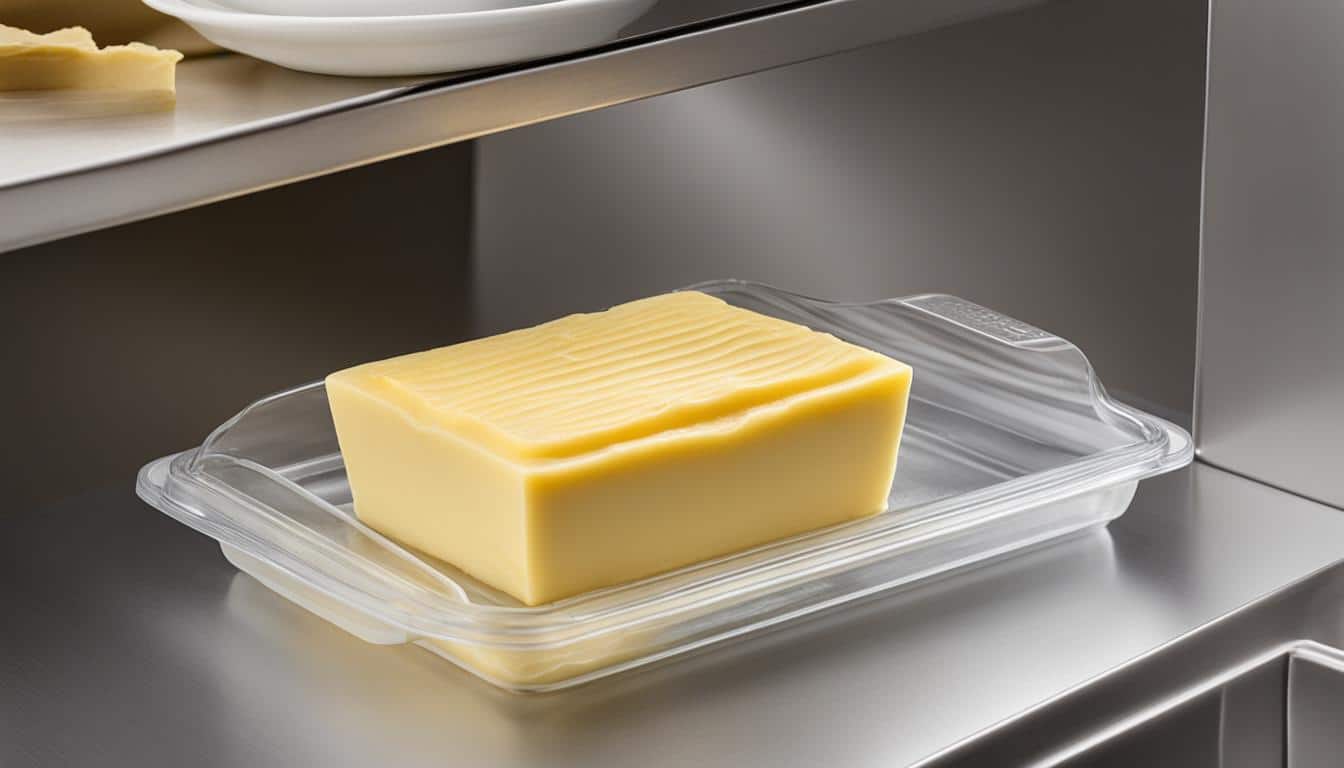Storing Butter Right: Tips for Freshness Flavor

Proper butter storage is essential for maintaining its freshness and flavor. By following the right methods, you can ensure that your butter stays in optimal condition for an extended period of time.
In this article, we will provide you with helpful tips on how to store butter effectively, whether you choose to refrigerate or freeze it.
- Understanding Butter Shelf Life and Storage Requirements
- Tips for Refrigerating Butter
- Guidelines for Freezing Butter
- Best Practices for Preserving Butter Freshness
- Long-Term Butter Storage Tips
- FAQ
- How should butter be stored to maintain its freshness?
- Can butter be stored at room temperature?
- How long can butter be stored in the refrigerator?
- What is the best way to freeze butter?
- How long can frozen butter be stored?
- How does storing butter in a cool place help preserve its freshness?
- Should I vacuum-seal butter for long-term storage?
- Can previously frozen butter be refrozen?
- How can I preserve the quality of butter during storage?
Understanding Butter Shelf Life and Storage Requirements
Butter has a limited shelf life and must be stored properly to prevent spoilage. When it comes to storing butter, different methods can be used depending on the desired shelf life and the desired consistency of the butter.
Unsalted butter can be safely stored at room temperature for a few days, but it is best to refrigerate it to prolong its freshness. Refrigerating unsalted butter is especially necessary during warmer months when room temperature can be higher, leading to quicker spoilage.
When refrigerating butter, it is essential to wrap it properly to prevent absorption of odors from other foods. You can use wax paper or butter wrapping paper to ensure that your butter stays fresh and free from any unwanted flavors.

If you wish to extend the shelf life of butter even further, freezing is the way to go. Freezing butter can extend its shelf life for several months. However, it is important to note that freezing may change the texture of the butter slightly. Freeze butter in an airtight container or wrap it tightly in freezer-safe packaging to prevent freezer burn and maintain its quality.
Whether you decide to refrigerate or freeze your butter, always keep in mind that butter can absorb odors easily. To avoid any flavor contamination, make sure to keep your butter away from strong-smelling foods or wrap it securely.
Butter Shelf Life Comparison
| Storage Method | Shelf Life |
|---|---|
| Room Temperature | Few days |
| Refrigeration | Up to a month |
| Freezing | Several months |
By understanding the shelf life and storage requirements of butter, you can ensure that your butter remains fresh and delicious for as long as possible. In the next sections, we will provide you with more specific tips on refrigerating butter and freezing butter to help you make the most out of your storage methods.
Tips for Refrigerating Butter
When it comes to refrigerating butter, proper storage is key to maintaining its freshness and flavor. Here are some helpful tips:
Use a Butter Dish with a Lid or a Butter Keeper
Using a butter dish with a lid or a butter keeper is an excellent way to protect your butter from air exposure. These containers provide a sealed environment that helps to preserve the butter's quality and prevent it from absorbing odors from other foods. Look for a butter dish with a tight-fitting lid or a butter keeper specifically designed for storing butter.

Wrap the Butter in Wax Paper or Aluminum Foil
If you don't have a butter dish or a butter keeper, you can still ensure proper storage by wrapping the butter in wax paper or aluminum foil. This additional layer helps to protect the butter from air exposure and maintain its freshness. Ensure that the wrapping is secure and tightly sealed to prevent any air from reaching the butter.
Store Butter Away from Strong-Smelling Foods
"Proper storage is essential for refrigerating butter and maintaining its flavor."
When refrigerating butter, it is important to keep it away from strong-smelling foods. Butter has a tendency to absorb odors, which can impact its taste and aroma. To avoid any flavor contamination, store your butter in a separate section or container away from strong-smelling foods such as onions, garlic, or cheese.
| Refrigerating Butter Tips | Benefits |
|---|---|
| Use a butter dish with a lid or a butter keeper | Protects butter from air exposure and odor absorption |
| Wrap butter in wax paper or aluminum foil | Additional barrier against air exposure |
| Store butter away from strong-smelling foods | Preserves the butter's flavor |
By following these tips, you can ensure that your refrigerated butter stays fresh and flavorful for a longer period of time.
Guidelines for Freezing Butter
When it comes to long-term storage, freezing butter is a great option. By freezing butter, you can preserve its freshness and quality for an extended period of time. To ensure the best results, follow these guidelines:
- Cut the butter into portions: Before freezing, it is recommended to cut the butter into portions or use an ice cube tray to freeze individual servings. This will allow you to conveniently use only the amount of butter you need without having to thaw the entire package.
- Proper packaging: Use an airtight freezer-safe container or wrap the butter tightly in plastic wrap or foil to prevent freezer burn and maintain its flavor.
- Labeling: Remember to label the package with the date of freezing to keep track of its freshness. This will help you manage your frozen butter inventory and ensure you use the oldest butter first.
- Freezing duration: Frozen butter can generally be stored for up to six months. However, for the best quality and taste, it is recommended to use it within three months.
Note: Avoid refreezing previously frozen butter as it may affect the texture and quality.
Thawing frozen butter is a simple process. When you're ready to use it, transfer the frozen butter to the refrigerator and let it thaw overnight. This slow thawing method helps retain the butter's moisture and prevents texture changes. Avoid thawing at room temperature or using a microwave, as these methods can quickly soften the butter, resulting in uneven texture and potential loss of flavor.
By following these guidelines for freezing and thawing butter, you can enjoy the convenience of long-term storage while preserving the quality and flavor of your butter.
Best Practices for Preserving Butter Freshness
Preserving the freshness of butter is crucial to ensure its optimal quality and flavor. By following these best practices, you can prolong the shelf life of your butter and enhance your culinary creations.
Storing Butter in a Cool Place
To maintain the freshness of butter, it is essential to store it in a cool place away from direct sunlight and heat sources. These environmental factors can lead to the butter melting or becoming rancid, affecting its taste and overall quality.
The Butter Bell Method
A popular method for preserving butter freshness at room temperature is by using a butter bell. A butter bell consists of a two-piece ceramic dish that holds a softened stick of butter. The dish is filled with water, creating an airtight seal that prevents air exposure and maintains the butter's freshness.
By keeping the butter bell on your countertop, you can enjoy the convenience of spreadable butter without compromising its quality.
Checking Expiration Dates and Butter Quality
Before storing butter, it is essential to check the expiration date and quality. Expired or low-quality butter can negatively impact the taste and texture of your dishes. Ensure that the butter is fresh and of high quality to enhance your culinary creations.
Proper storage and handling can significantly impact the taste and texture of butter.
By implementing these best practices for preserving butter freshness, you can enjoy the rich flavor and smooth texture of butter in your recipes.
Long-Term Butter Storage Tips
When it comes to long-term butter storage, vacuum-sealing is a game-changer. By removing the air and sealing the butter tightly, you can prevent freezer burn and extend its shelf life significantly. This method is perfect for those who want to stock up on butter or have surplus butter that needs to be stored for extended periods.
If you choose to freeze your butter, it can stay fresh for up to six months when properly vacuum-sealed. However, it's important to note that the quality and taste of butter may slightly diminish the longer it's in the freezer. For the best flavor, it's recommended to consume frozen butter within the six-month timeframe.
For shorter-term storage, such as in the refrigerator, vacuum-sealed butter can still be a great option. Refrigerated butter should be consumed within a month to retain its optimal freshness. Remember to label and date your butter to keep track of its storage duration and ensure you always use the oldest butter first.
Whether you choose to store your butter in the freezer or the refrigerator, vacuum-sealing is the key to maintaining its quality for longer. By investing in a vacuum sealer, you can keep your butter fresh, conveniently on hand, and ready to elevate your meals whenever you need it.
FAQ
How should butter be stored to maintain its freshness?
Butter can be stored in the refrigerator or at room temperature, depending on your preference and the desired shelf life. If refrigerating, use a covered butter dish or wrap it in wax paper or aluminum foil before placing it in a sealed container. To store at room temperature, use a butter bell to keep it fresh.
Can butter be stored at room temperature?
Unsalted butter can be stored at room temperature for a few days, but refrigeration is recommended for longer freshness. Salted butter can be stored at room temperature for even longer due to its higher salt content.
How long can butter be stored in the refrigerator?
Refrigerated butter can be stored for up to a month. Ensure it is properly wrapped or stored in a covered container to prevent absorption of odors from other foods.
What is the best way to freeze butter?
Before freezing, it is advisable to cut the butter into portions or freeze individual servings in an ice cube tray. Thaw frozen butter in the refrigerator overnight before use.
How long can frozen butter be stored?
Frozen butter can be stored for up to six months. Label and date the packaging for easy tracking of storage duration.
How does storing butter in a cool place help preserve its freshness?
Storing butter away from direct sunlight and heat sources helps maintain its flavor and prevent it from becoming rancid. A butter bell can be used to keep butter at room temperature while still keeping it fresh.
Should I vacuum-seal butter for long-term storage?
Vacuum-sealing is an effective method to prevent freezer burn and extend the shelf life of butter. It is recommended for long-term storage in the freezer.
Can previously frozen butter be refrozen?
It is not recommended to refreeze butter that has already been frozen, as it may affect the texture and quality of the butter.
How can I preserve the quality of butter during storage?
Always check the expiration date and quality of the butter before storing it. Proper wrapping and storage away from strong-smelling foods can significantly impact the taste and texture of the butter.